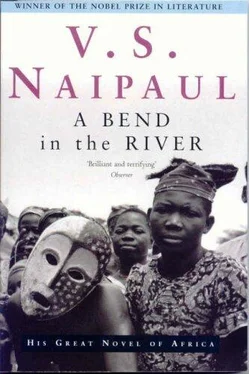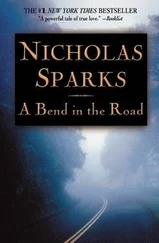V. Naipaul - A bend in the river
Здесь есть возможность читать онлайн «V. Naipaul - A bend in the river» весь текст электронной книги совершенно бесплатно (целиком полную версию без сокращений). В некоторых случаях можно слушать аудио, скачать через торрент в формате fb2 и присутствует краткое содержание. Год выпуска: 1989, ISBN: 1989, Издательство: Vintage, Жанр: Современная проза, на английском языке. Описание произведения, (предисловие) а так же отзывы посетителей доступны на портале библиотеки ЛибКат.
- Название:A bend in the river
- Автор:
- Издательство:Vintage
- Жанр:
- Год:1989
- ISBN:978-0679722021
- Рейтинг книги:5 / 5. Голосов: 1
-
Избранное:Добавить в избранное
- Отзывы:
-
Ваша оценка:
- 100
- 1
- 2
- 3
- 4
- 5
A bend in the river: краткое содержание, описание и аннотация
Предлагаем к чтению аннотацию, описание, краткое содержание или предисловие (зависит от того, что написал сам автор книги «A bend in the river»). Если вы не нашли необходимую информацию о книге — напишите в комментариях, мы постараемся отыскать её.
) V.S. Naipaul takes us deeply into the life of one man—an Indian who, uprooted by the bloody tides of Third World history, has come to live in an isolated town at the bend of a great river in a newly independent African nation. Naipaul gives us the most convincing and disturbing vision yet of what happens in a place caught between the dangerously alluring modern world and its own tenacious past and traditions.
A bend in the river — читать онлайн бесплатно полную книгу (весь текст) целиком
Ниже представлен текст книги, разбитый по страницам. Система сохранения места последней прочитанной страницы, позволяет с удобством читать онлайн бесплатно книгу «A bend in the river», без необходимости каждый раз заново искать на чём Вы остановились. Поставьте закладку, и сможете в любой момент перейти на страницу, на которой закончили чтение.
Интервал:
Закладка:
In the beginning, before the arrival of the white men, I had considered myself neutral. I had wanted neither side to win, neither the army nor the rebels. As it turned out, both sides lost. Many of the soldiers--from the famous warrior tribe--were killed. And afterwards many more lost their guns and overstarched uniforms and the quarters they had spent so much of their money furnishing. The army was reorganized by the President, far away in the capital; in our town the army became more mixed, with men from many tribes and different regions. The men of the warrior tribe were turned out unprotected into the town. There were dreadful scenes at the barracks; the women wailed in the forest way, lifting their bellies and letting them drop heavily again. A famous tribe, now helpless among their traditional prey: it was as though some old law of the forest, something that came from Nature itself, had been overturned. As for the starveling rebels of our region, they soon began to reappear in the town, more starved and abject, their blackened rags hanging on them, men who only a few weeks before had thought they had found a fetish powerful enough to cause the guns of their enemies to bend and to turn bullets to water. There was bitterness in their wasted faces, and for a little while they were withdrawn, like people slightly crazed. But they needed the town they had wanted to destroy; as Mahesh said, they had been saved from suicide. They recognized the new intelligence that ran the country from afar, and they returned to their old habit of obedience. For the first time since I had arrived there was something like life at the van der Weyden. The steamers brought up not only supplies for the President's white men, but also very plump and fantastically dressed women from the downriver peoples, beside whom the women of our region, polers of dugouts and carriers of loads, looked like bony boys. Eventually we were allowed to drive out to the dam and the hydroelectric station, near where there had been fighting. The installations were untouched; but we had lost one of our new nightclubs. It had been started by a refugee from the Portuguese territory to the south (a man avoiding conscription), and it was beautifully sited, on a cliff overlooking the river. It was a place to which we had just begun to get accustomed. The trees were hung with small coloured bulbs and we sat out at metal tables and drank light Portuguese white wine and looked at the gorge and the floodlit dam; it was like luxury to us, and made us feel stylish. That place had been captured by the rebels and pillaged. The main building was basic and very ordinary--walls of concrete blocks around an unroofed dance floor with a covered bar at one side. The walls still stood (though they had tried to set the concrete alight: there were fire marks in many places); but all the fittings had been destroyed. The rage of the rebels was like a rage against metal, machinery, wires, everything that was not of the forest and Africa. There were signs of that rage in other places as well. After the earlier war a United Nations agency had repaired the power station and the causeway at the top of the dam. A metal plaque set on a small stone pyramid, some distance from the dam itself, recorded this fact. That plaque had been defaced, battered with some heavy metal piece, individual letters filed away. At the beginning of the causeway old cast-iron lamp standards from Europe had been placed as a decorative feature--old lamps at a site of new power. A pretty idea; but the lamp standards had also received a battering, and again attempts had been made to file away the lettering--the name of the nineteenth-century makers in Paris. It was the rage that made an impression--the rage of simple men tearing at metal with their hands. And already, after only a few weeks of peace, with so many people from the villages hungry and scrounging in the town, it seemed far away, hard to imagine. It was during these early days of the peace that Father Huismans went out on one of his trips and was killed. His death need never have been discovered; he could easily have been buried somewhere in the bush. But the people who killed him wanted the fact to be known. His body was put in a dugout, and the dugout drifted down the main river until it caught against the bank in a tangle of water hyacinths. His body had been mutilated, his head cut off and spiked. He was buried quickly, with the minimum of ceremony. It was terrible. His death made his life seem such a waste. So much of his knowledge was buried with him, and what to me was more than knowledge--his attitudes, his relish for Africa, his feeling for the beliefs of the forest. A little bit of the world was lost with him. I had admired him for his purity, but now I had to ask whether in the end it had been of value. A death like that makes us question everything. But we are men; regardless of the deaths around us we continue to be flesh and blood and mind, and we cannot stay with that questioning mood for long. When the mood went away I felt--what deep down, as a life-loving man, I had never doubted--that he had passed his time better than most of us. The idea Father Huismans had of his civilization had made him live his particular kind of dedicated life. It had sent him looking, inquiring; it had made him find human richness where the rest of us saw bush or had stopped seeing anything at all. But his idea of his civilization was also like his vanity. It had made him read too much in that mingling of peoples by our river; and he had paid for it. Little was said about the way he had died. But the body had floated down the main river in a dugout and must have been seen by many people. Word got around the lyc� In our town Father Huismans had the reputation--though most people were rather vague about him--of being a lover of Africa; and some of the boys at the lyc�were embarrassed and ashamed. Some were aggressive. Ferdinand--recovered from the days of fright, his wish to be back in his father's or mother's village--was one of the aggressive ones. I wasn't surprised. Ferdinand said, "It is a thing of Europeans, a museum. Here it is going against the god of Africans. We have masks in our houses and we know what they are there for. We don't have to go to Huismans's museum." "The god of Africans"--the words were Metty's, and Metty had got them from the leader of the uprising against the Arabs on the coast. I had heard the words for the first time that night when we heard the gunfire from the hydroelectric station and knew that we were safe. The words, occurring when they did, seemed to have released certain things in Ferdinand. Those days in the flat had been days of special crisis for Ferdinand, and he had ever since been settling into a new character. This one fitted, or made more sense. He was no longer concerned about being a particular kind of African; he was simply an African, himself, ready to acknowledge all sides of his character. It didn't make him easier. He abandoned politeness; he became aggressive and perverse, over a secret nervousness. He began to stay away from the shop and flat. I expected that; it was his way of demonstrating, after the great fright of the rebellion, that he could do without me. But then one day Metty brought me a letter from Ferdinand, and the letter moved me. It was a one-sentence letter written in very big letters on a lined sheet roughly torn out from an exercise book, and sent without an envelope, the sheet just folded small and tight. "Salim! You took me in that time and treated me as a member of your own family. F." It was his letter of thanks. I had given him shelter under my own roof, and to him, as an African, that hospitality was extraordinary and had to be acknowledged. But he didn't want to appear fawning or weak, and everything in the letter was deliberately crude--no envelope, the lined paper torn down one side, the very big and careless handwriting, the absence of the direct word of thanks, the "Salim!" and not "Dear Salim," the "F." and not "Ferdinand." I found it funny and moving. Yet there was something ironical about the whole thing. The action which had drawn that softness from Ferdinand was the simple gesture of a man from the coast whose family had lived close, too close, to their servants, once their slaves, descendants of people snatched from this part of Africa. Ferdinand would have been outraged if he knew. Still, the letter, and his unapologetic new character, showed how far, as a man, he had rounded out. And that was what his mother, Zabeth, had had in mind when she brought him to the shop and asked me to look after him.
Читать дальшеИнтервал:
Закладка:
Похожие книги на «A bend in the river»
Представляем Вашему вниманию похожие книги на «A bend in the river» списком для выбора. Мы отобрали схожую по названию и смыслу литературу в надежде предоставить читателям больше вариантов отыскать новые, интересные, ещё непрочитанные произведения.
Обсуждение, отзывы о книге «A bend in the river» и просто собственные мнения читателей. Оставьте ваши комментарии, напишите, что Вы думаете о произведении, его смысле или главных героях. Укажите что конкретно понравилось, а что нет, и почему Вы так считаете.












